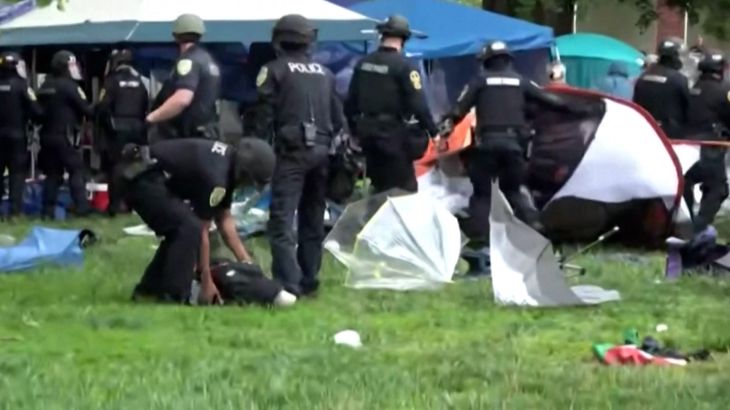Over a continuous span of one week, an assortment of individuals, most of whom had not previously met, converged outside the Federal Detention Center on Alameda Street, DTLA. Their mission was to amass provisions, lead protests against the federal immigration raids, and keep an eye on the movement of vehicles entering and exiting the facility. However, their round-the-clock vigil, dubbed the “ICE Out of L.A. Camp”, was forcibly dismantled on Friday morning. Law enforcement and sanitation personnel used municipal laws, commonly cited to displace and penalize people in unhoused situations, to clear the makeshift camp.
Law enforcement arrived on the scene around 10 a.m., promptly closing off the segment of Alameda Street between Temple and Commercial Streets with yellow barrier tape. City employees then set about dismantling several canopies that housed items such as water, food, informational pamphlets, and art supplies, protected against the sun and the heat of the 80-degree day. By noon, only a few personal effects rescued by the protesters remained. One protestor commented on the loss of provisions, asserting that despite the setback, their spirit remained unbroken.
No sooner had the law enforcement vehicles departed than the resolve of the protestors shone through. A new table was swiftly erected while cars arrived bearing fresh donations. Eddy, a protestor, emphasized their resilience against the loss of material items and asserted the intrinsic worth of the individuals involved. He characterized the ICE Out of L.A. Camp as a crucial platform empowering locals to exercise their First Amendment right to freedom of speech in a peaceful manner.
“The essence of the camp is to allow individuals to express their dissent at any time of the day,” Eddy added. The group, he explained, was mindful of facilitating people with non-traditional work schedules to take part. “This location allows us to witness firsthand the questionable activities at this facility,” he commented, suggesting the sight of agents in masks might galvanize individuals into action.
Eddy also noted that beyond supporting protestors, the camp served a broader community purpose by providing vital resources such as food and water to the unhoused residents in the area. Eddy spoke of the multifaceted nature of activism and protest, highlighting the peaceful nature of their 23-hour 30-minute daily demonstration, which contrasted starkly with the occasionally violent detainment of protestors that typically spread virally online.
The process of reestablishing the camp post-dispersal was gradual and occurred under the watchful guise of LAPD patrol cars completing their rounds. Around 1 p.m., just as a new 10 x 10 canopy tent was being unloaded, police officers pursued and detained a man who had earlier temporarily obstructed an LAPD SUV. A large police contingent responded, eventually citing and releasing him for allegedly hindering the movement of a police vehicle.
At one point during the afternoon, an officer approached a woman named Melissa who had set up a tent. LAPD Sergeant Claudia Avila queried her actions and advised her to disassemble the tent. Over the span of the day, officers routinely referred to LAMC 56.11 and LAMC 41.18—ordinances ordinarily invoked to regulate and restrict the activities of the unhoused. These laws prohibited leaving personal items in public spaces and setting up temporary accommodations near certain specified ‘sensitive’ sites.
During the ICE Out of L.A. Camp dispersal, officers continuously maintained that the camp was within the 500-foot limit of a daycare clinic at 255 East Temple Street, corresponding to the DTLA Veteran Affairs Clinic located opposite the camp. Shortly after receiving the warning, Melissa found herself in handcuffs. As the police escorted her to their SUV, she called out defiant messages of resistance and liberation.
Roughly an hour later, at 2:35 p.m., the police returned to dismantle Melissa’s tent. As they executed their task amidst the vocal disapproval of the protestors, the resilient spirit of the group was evident yet again. As soon as the officers had left, people arrived bearing water and other donations to support the camp.
Despite the incessant surveillance from the LAPD, Melissa emerged undeterred, her radiant smile echoing her determination. In a brief exchange, she revealed that the police had cited her for erecting a tent within 500 feet of a daycare, leading to her brief detainment. However, when asked if the arrest would dissuade her from protesting in the future, her spirited reply affirmed her dedication to the cause. “I’m back here again; I have to take up my place,” she asserted, noting her husband’s concern but emphasizing her strong sense of obligation.

